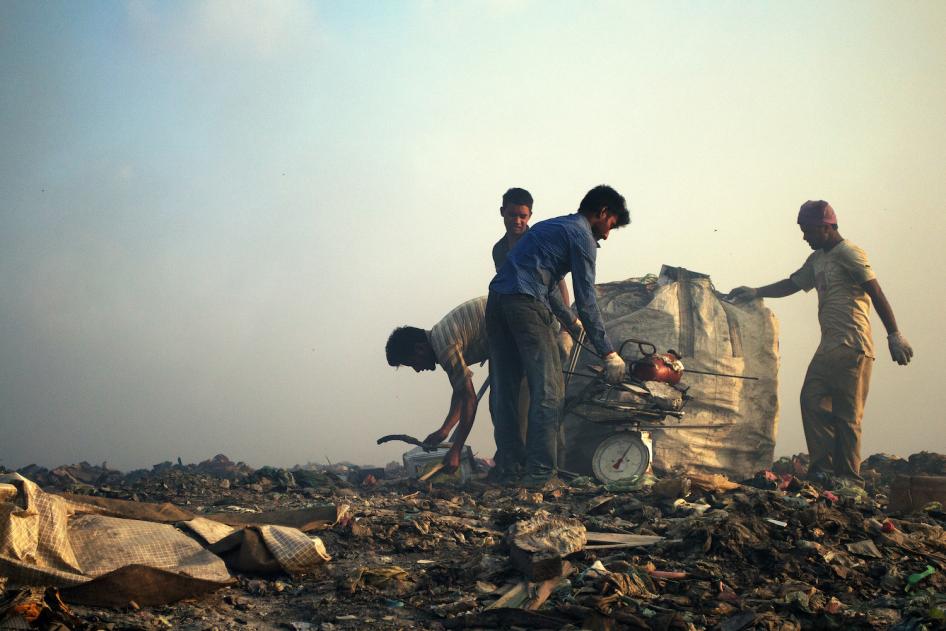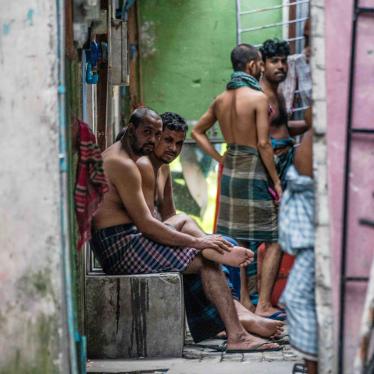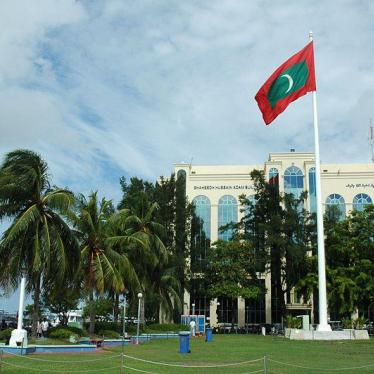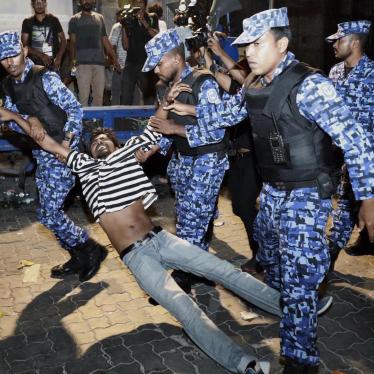(New York) – The Maldives police have detained more than 80 migrant workers in July for protesting unpaid wages, inhumane living conditions, and labor rights violations, Human Rights Watch said today. The authorities should drop charges and release all those held for engaging in peaceful protest, and address allegations of human trafficking and other abuses against the island nation’s sizable migrant worker population.
After police arrested 22 migrant workers taking part in a protest on Vaavu Atoll on July 21, 2020, senior defense officials claimed that the protests were “riots,” labeled the migrant population “an issue to national security,” and denied that the protests stemmed from longstanding human rights violations.
“Top Maldives officials are invoking national security to deflect from their own failure to curb rampant abuses against migrant workers,” said Patricia Gossman, associate Asia director. “Instead of suppressing protests, Maldives authorities should address and remedy the violations of migrant workers’ rights that are spurring people to the streets.”
Migrants working in construction and tourism industries have held demonstrations since May to protest withheld wages, as other reports of exploitation and mistreatment have surfaced. On July 2, police arrested 19 protesters in Bodufinolhu who said they had been forced to work without pay for six months. The protesters had prevented 13 local staff from leaving the island. Police later announced they were investigating the employer on allegations of human trafficking, wage theft, and firing employees for protesting their unpaid salaries. A law firm filed a legal request on behalf of the 200 company employees for back pay, damages, and safe repatriation.
Police in Hulhumalé arrested 41 migrant workers on July 13 following a confrontation during which the workers damaged police vehicles. The workers, who were employed by a construction company, were protesting non-payment of wages since the government imposed a lockdown in March to slow the spread of Covid-19.
On July 21, Defence Minister Mariya Ahmed Didi told the Parliamentary Committee on National Security and Foreign Relations that the claims of withheld wages were a pretext for migrant workers to stage protests and cause unrest. She claimed the protesters in Hulhumalé “went out and caused unrest while the company was somewhat paying them and holding discussions.” She added: “We believe that this is tied to national security. [They are] not necessarily getting out to ensure their rights.”
The chief of the Defence Force, Maj. Gen. Abdulla Shamaal, echoed the defense minister’s allegations at the same committee, ramping up fearmongering about the supposed threat migrants pose to Maldives’ national security. “They have penetrated our society in every area,” he said. “They are actively involved in crime as well. And finally, we see the ones who attacked the police the other day. That is why this becomes an issue to national security.” He went on to announce plans for a crackdown targeting the migrant population: “Discussions have taken place in the National Security Council regarding this issue as well. For example, how we can take steps against the ‘illegal people,’ how we can send them back.”
Authorities estimate there are about 82,000 registered and 63,000 undocumented migrant workers in the Maldives – around one-third of the total population – the majority from Bangladesh. The Covid-19 outbreak in the country has disproportionately affected them, exacerbated by poor living and working conditions, while spotlighting pre-existing abuses. Congested shared accommodations, inequitable access to medical care, and labor conditions that limit the ability to socially distance increase migrant workers’ risk of exposure to the virus. Migrants make up more than half of the country’s confirmed Covid-19 cases, which has spurred reports of discrimination and growing stigma.
Although employers in the Maldives are legally obligated to provide all migrant workers with health insurance, coverage is often minimal and many are not informed that they have insurance. Employers also illegally confiscate workers’ papers, making it difficult for them to obtain health care. Undocumented workers are especially vulnerable.
The Maldives government should ratify the International Convention on Migrant Workers and the International Labour Organization’s 2014 Protocol to the Forced Labour Convention, which protects victims of forced labor, and enforce its provisions. The government should also uphold its international obligations to respect the right of everyone in the country to peacefully protest.
The United States ranked Maldives at “Tier 2 Watch List” in its 2020 Trafficking in Persons report, documenting the Maldives’ failure to prevent “practices indicative of forced labor, including fraudulent recruitment, confiscation of identity and travel documents, withholding or non-payment of wages, and debt-based coercion,” as well as human trafficking and exploitation of trafficking victims.
On July 14, the Home Affairs Ministry declared that street protests and marches could only be held with prior written approval from the Maldives Police Service, except in one closed-off location in the capital, Malé. The ministry said it was acting in accordance with the 2016 Freedom of Peaceful Assembly Act, which the previous government enacted to crack down on civil society.
“Against the backdrop of Covid-19, Maldives authorities should be looking to boost protections for its most vulnerable groups, not put them in the crosshairs of a manufactured national security crisis,” Gossman said. “The government should focus its efforts on ending human trafficking, upholding the rights to freedom of speech and assembly, and ensuring migrants have safe housing, get access to health care, and receive their wages.”







